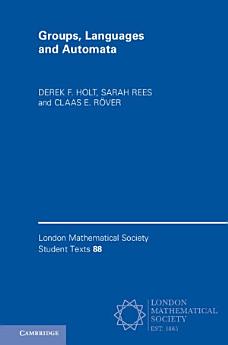Groups, Languages and Automata
feb 2017 · London Mathematical Society Student Texts Libro 88 · Cambridge University Press
eBook
307
Páginas
reportLas valoraciones y las reseñas no se verifican. Más información
Información sobre este eBook
Fascinating connections exist between group theory and automata theory, and a wide variety of them are discussed in this text. Automata can be used in group theory to encode complexity, to represent aspects of underlying geometry on a space on which a group acts, and to provide efficient algorithms for practical computation. There are also many applications in geometric group theory. The authors provide background material in each of these related areas, as well as exploring the connections along a number of strands that lead to the forefront of current research in geometric group theory. Examples studied in detail include hyperbolic groups, Euclidean groups, braid groups, Coxeter groups, Artin groups, and automata groups such as the Grigorchuk group. This book will be a convenient reference point for established mathematicians who need to understand background material for applications, and can serve as a textbook for research students in (geometric) group theory.
Acerca del autor
Derek F. Holt is a professor of mathematics at the University of Warwick. He authored the successful Handbook of Computational Group Theory, which has now become the standard text in the subject, and he co-authored The Maximal Subgroups of Low-Dimensional Groups (with John N. Bray and Colva M. Roney-Dougal, Cambridge, 2013). Holt was also one of five co-authors of the seminal book Word Processing in Groups (1992) on the theory of automatic groups, and has contributed mathematical software to the Magma and GAP systems. In 1981, he was awarded the London Mathematical Society Junior Whitehead Prize.
Valorar este eBook
Danos tu opinión.
Información sobre cómo leer
Smartphones y tablets
Instala la aplicación Google Play Libros para Android y iPad/iPhone. Se sincroniza automáticamente con tu cuenta y te permite leer contenido online o sin conexión estés donde estés.
Ordenadores portátiles y de escritorio
Puedes usar el navegador web del ordenador para escuchar audiolibros que hayas comprado en Google Play.
eReaders y otros dispositivos
Para leer en dispositivos de tinta electrónica, como los lectores de libros electrónicos de Kobo, es necesario descargar un archivo y transferirlo al dispositivo. Sigue las instrucciones detalladas del Centro de Ayuda para transferir archivos a lectores de libros electrónicos compatibles.







